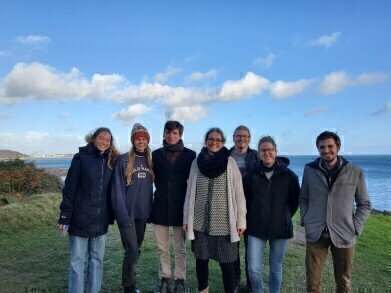-
 Stineke van Houte and research team
Stineke van Houte and research team
News
Bacterial Defences Investigations win ERC Starting Grant
Jan 17 2022
To further our understanding of the movement of DNA between bacteria, researchers at the University of Exeter are undertaking a major project to investigate how the spread of these mobile genetic elements (MGEs) are influenced by bacterial defences.
MGEs, which can change key traits of bacteria such as antibiotic resistance and virulence (the severity of illness they can cause), can be seen in various forms including phages (viruses that infect bacteria) and plasmids (circular DNA molecules).
Dr Stineke Van Houte, at the University’s Environment and sustainability Institute has been awarded a €1.5 million European Research Council (ERC) Starting Grant for the project, called MUSIC (MGE Uptake and Spread in Microbial Communities), with a further €1 million for a Fluorescence-activated cell sorting (FACS) machine.
"This MUSIC project aims to understand how bacterial immune systems keep MGEs out," said Dr Van Houte, "It will investigate the relative importance of the different individual bacterial defences, using a combination of bacterial genome sequence analyses and laboratory experiments.
"The goal is to develop a comprehensive picture of which bacterial defences are particularly important in blocking MGE infections, and this information will allow us to predict whether a bacterium can or can’t become infected with an MGE, based solely on the defence repertoire found in that bacterium’s genome.
"From this, we will use machine learning approaches in order to build towards understanding how MGEs spread through communities of multiple bacterial species, based on the knowledge of what defences exist in that community."
The project's "blue sky" approach was not specifically focussed on human health – but on understanding key processes of bacterial evolution, he added. However, this understanding could be vital in the emerging antibiotic resistance crisis.
The award to Dr Van Houte, one of 397 ERC Starting Grants given to early-career researchers, from a total of €619 million awarded, are intended to help "ambitious younger researchers launch their own projects, form their teams and pursue their best ideas".
ERC president Professor Maria Leptin said: "Letting young talent thrive in Europe and go after their most innovative ideas – this is the best investment in our future, not least with the ever-growing competition globally.
"We must trust the young and their insights into what areas will be important tomorrow. So, I am thrilled to see these new ERC Starting Grant winners ready to cut new ground and set up their own teams."
More information online
Digital Edition
Lab Asia Dec 2025
December 2025
Chromatography Articles- Cutting-edge sample preparation tools help laboratories to stay ahead of the curveMass Spectrometry & Spectroscopy Articles- Unlocking the complexity of metabolomics: Pushi...
View all digital editions
Events
Jan 21 2026 Tokyo, Japan
Jan 28 2026 Tokyo, Japan
Jan 29 2026 New Delhi, India
Feb 07 2026 Boston, MA, USA
Asia Pharma Expo/Asia Lab Expo
Feb 12 2026 Dhaka, Bangladesh


















